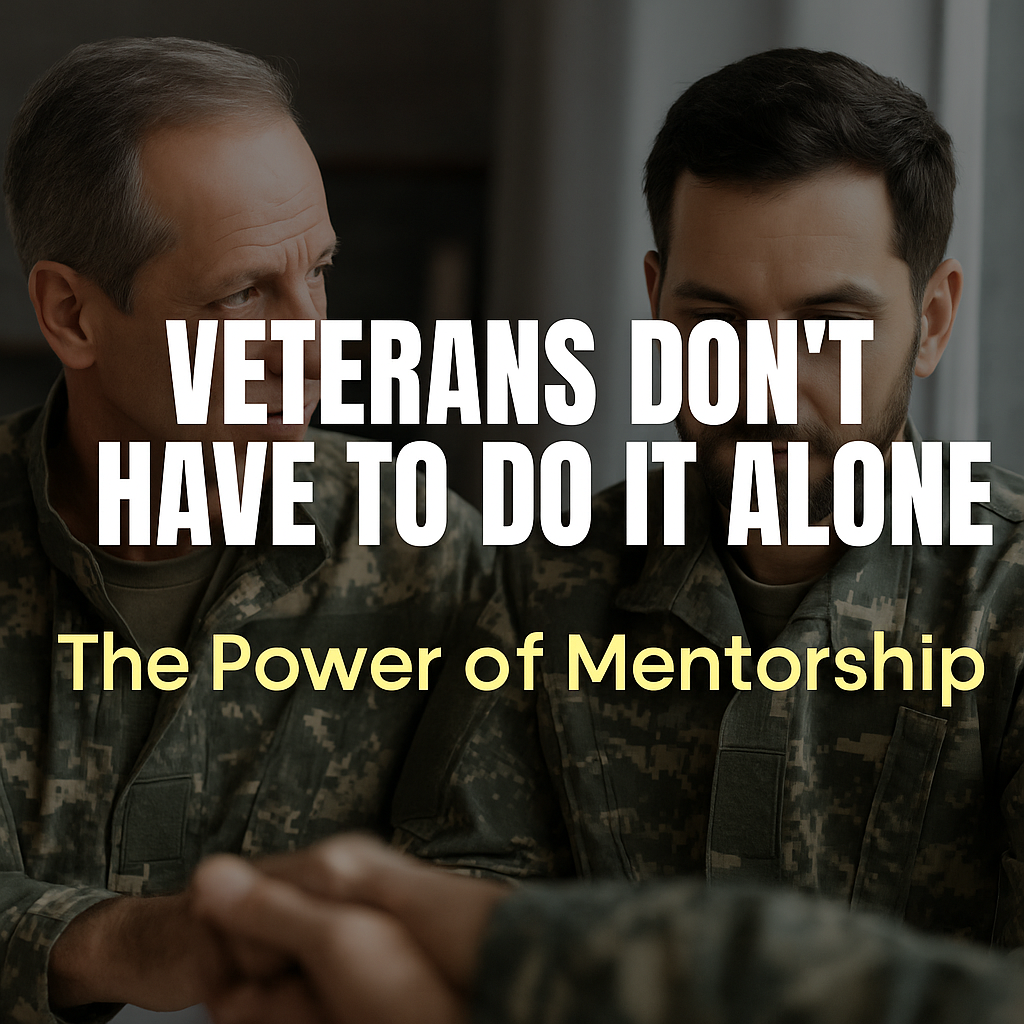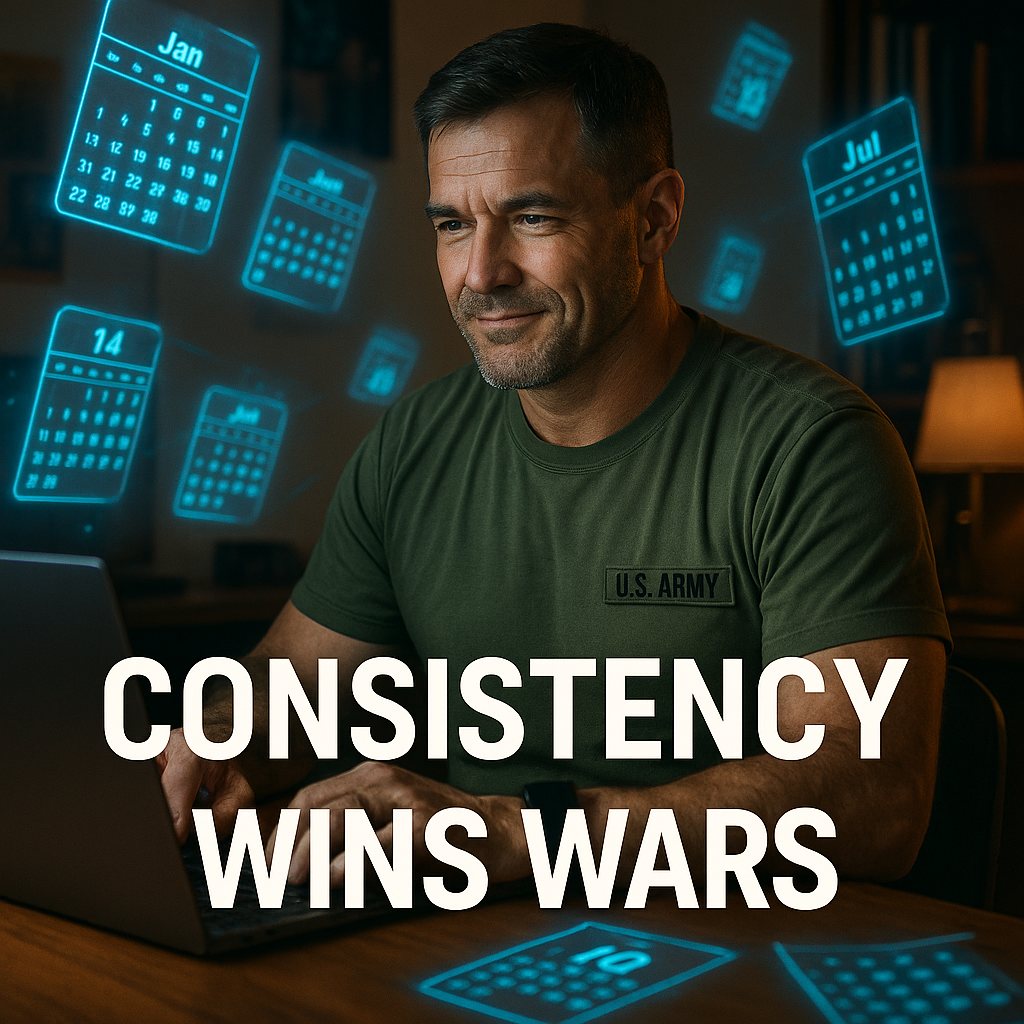Here’s a confession you won’t find on the average LinkedIn feed: My trickiest battle after the military wasn’t hunting for jobs or decoding civilian lingo. It was suddenly being stranded on the business frontlines with no squad. Suddenly, familiar discipline clashed with solo second-guessing. In business, the myth is that you’re supposed to figure it all out alone—but trust me, even John Wayne needed backup. Let’s talk about how one unexpected call with another vet (thanks, Zoom) cut my floundering in half, and why trying to lone-wolf your way into entrepreneurship is vastly overrated.
The Real Enemy: Isolation After Transitioning from Military to Civilian Life
When I left the military, I thought the hardest part would be finding a job. Or figuring out healthcare. Maybe translating my experience into civilian terms.
But it wasn't any of that.
It was doing it alone.
For years, we operated in squads, units, and teams. We had battle buddies. Command structures. Even when missions got tough—we weren't solo. Then civilian life hit, and suddenly I was trying to figure out everything by myself.
Adjusting from team-based operations to solo navigation left me second-guessing everything. Decisions that would've taken minutes with my unit now stretched into hours of doubt. Should I take this job? Start that business? Trust this advice?
Research shows that veterans often face unexpected challenges with isolation after discharge, impacting business success. But here's what caught me off guard—many veterans underestimate how jarring it can feel when camaraderie vanishes overnight.
In the military, you're never truly alone. Someone always has your six. There's always backup, always someone who's been there before. Transitioning from military to civilian life strips that away faster than you realize.
When Business Becomes a Solo Mission
Being alone on the business battlefield can make even small setbacks seem like defeat. I'd watch tutorials for hours, start projects, then abandon them because I had no one to bounce ideas off. No one to tell me if I was on the right track.
That's when it hit me:
"Even the strongest soldier falters when left without support."
This isolation is one of the biggest veteran entrepreneurship challenges we face. We're trained to execute under pressure, adapt quickly, and push through obstacles. But we're also trained to do it as part of a team.
Strip away that team element, and even the most capable veteran can struggle. It's not about lacking skills or determination—it's about missing the importance of community for veterans trying to build something new.
The loneliness wasn't just emotional. It was tactical. Without someone who'd walked the path before, every mistake felt massive. Every wrong turn felt permanent.
That's when I realized: trying to lone wolf your way through entrepreneurship isn't brave—it's inefficient.
Why Going Solo in Business Feels Like Clearing a Room Without Backup
Picture this: you're stacked up outside a door, ready to breach. But instead of your team beside you, it's just... you. That's exactly what starting an online business felt like after leaving the military.
For months, I tried every online course I could find. YouTube tutorials became my evening entertainment. I'd start one program, get halfway through, then switch to another "proven system" that promised faster results. The progress was painfully slow and, honestly, lonely as hell.
Here's what nobody tells you about veteran mentorship in business—it's not just about learning faster. It's about having someone who gets the military mindset watching your six while you figure this civilian entrepreneur thing out.
The Message That Changed Everything
I was about ready to give up when I got a LinkedIn message from another veteran. He'd been quietly watching my posts about struggling with online business and simply said: "Hey brother, I've been where you are. Let me show you what worked for me."
That turning point came during a single 15-minute call. No sales pitch. No complicated strategies. Just genuine advice from someone who'd walked the same path and made it to the other side.
Research shows that mentored business owners achieve double the success rate of those without mentors—and brother, I felt that difference immediately. That call turbo-charged my clarity and direction in ways months of solo grinding never could.
The Tactical Advantage of Veteran Support
Think about it. In the military, we learned from NCOs who'd already done the job. We didn't reinvent the wheel—we followed proven procedures and adapted them to our mission.
Online business support for veterans works the same way. It's about:
- Learning from someone's mistakes instead of making your own
- Getting real-time feedback on what actually moves the needle
- Having accountability that keeps you moving forward
- Finding that camaraderie we're wired to need
"Mentorship isn't a crutch—it's a tactical advantage."
The statistics don't lie: small business owners with mentors have a 70% success rate compared to just 35% for those going it alone. That's not coincidence—that's the power of accelerating success through mentorship.
You didn't clear rooms solo in the military. Why try to build your business that way?
From Military Models to Mentorship Magic: How Vets Learn Faster Together
Here's something I figured out the hard way: we're already wired for mentorship. Think about it—every promotion, every skill, every mission success came from following someone who'd been there before. That NCO who showed you the ropes? That seasoned officer who had your back? We're primed to follow leaders, which makes mentorship a perfect fit for veterans stepping into business.
But here's where it gets interesting. Research shows that veteran entrepreneurs own 10% of all small businesses and 14% of franchises in the U.S. That's not by accident. We know how to take direction, execute under pressure, and adapt quickly—especially when we have the right guidance.
The Weekly Check-In That Changed Everything
Remember those weekly accountability sessions in the service? Turns out, they work just as well in business. My mentor introduced me to something simple but powerful: weekly check-ins with real talk and honest feedback. No sugar-coating, no participation trophies—just straight feedback on what was working and what wasn't.
Those sessions became game-changers for my progress. Instead of spinning my wheels for months trying to figure things out alone, I had someone cutting through the noise, pointing out my blind spots, and keeping me focused on what actually moved the needle.
Finding Your Battle Buddy in Business
Programs like SCORE mentoring for veterans and American Corporate Partners get this. They specialize in matching veterans with seasoned business mentors who understand our unique transition challenges. These aren't just random business coaches—they're people who recognize that veterans excel in environments with guidance and clear expectations.
The right mentor provides something crucial we're missing in civilian life: structure, motivation, and that sense of belonging. It's not about being handheld. As one successful veteran entrepreneur told me:
"Business success isn't handed to you—it's taught, trained, and supported."
What really makes veteran business coaching programs effective is the community element. Camaraderie and accountability in veteran mentorship creates that familiar environment where we naturally thrive. We're used to having battle buddies, and business mentorship fills that gap.
Studies indicate that veterans with mentors have significantly higher business survival rates. When you combine our natural leadership abilities with the right guidance system, something powerful happens—we start moving faster than we ever thought possible.
The best part? Veteran business resources are specifically designed around how we learn and operate. No fluff, no endless theory—just actionable steps from people who've walked the path.
Wild Card: The One-Call Myth and the Power of Real Connection
Here's the truth about what you see online: it's a highlight reel. Everyone looks like they're two steps ahead, crushing it from day one. But here's what's missing from those success posts—the mentor behind the scenes who's been quietly guiding the whole journey.
I learned this the hard way. For months, I thought I had to figure everything out solo. Sound familiar? That's not how we operated in the military, yet somehow I convinced myself business was different.
The Cheat Code Most Veterans Miss
Research shows that veterans with mentorship outperform their peers and often cite the right connection as transformative. It's not luck—it's leverage. The right person at the right time doesn't just feel like a cheat code for veteran small business owners; it actually is one.
Think about your best NCO or commanding officer. They didn't just bark orders—they showed you the shortcuts, warned you about the pitfalls, and had your back when things got tough. Finding a mentor for business success works exactly the same way.
"You're not behind, you're just one connection away."
No One Wins Alone (Seriously, No One)
Every successful veteran-owned business I know has one thing in common: they didn't go it alone. Whether it's veteran business networks, a coach, or that one person who answered their desperate 2 AM text—there's always someone in their corner.
The veterans who make it aren't necessarily smarter or more talented. They just understood something crucial: no one wins alone. Every sustainable business leans on a network or a guide who's already walked the path.
Overcoming Imposter Syndrome Through Connection
You know that voice that says you're not qualified? That's imposter syndrome talking, and it hits veterans especially hard. But here's what veteran business networks teach us: everyone feels that way at first.
The difference? Overcoming imposter syndrome as a veteran becomes possible when you realize you're not the first person to feel lost in the transition. Someone else has been exactly where you are right now—and they're willing to help.
That 15-minute conversation I had with another veteran didn't just give me tactical advice. It gave me permission to stop pretending I had it all figured out and start learning from someone who actually did.
Don't Lone Wolf It—The Secret Sauce Is Community
Here's the truth that took me way too long to accept: trying to build a business solo is like going into combat without backup. Sure, you might survive, but why make it harder than it needs to be? I spent months spinning my wheels, watching endless YouTube videos and thinking I could figure it all out myself. Classic mistake. The breakthrough came when I finally swallowed my pride and reached out for help.Strength in Numbers, Not Solo Missions
Research shows that veteran businesses have double the five-year survival rate of non-veteran businesses—but here's the kicker: that success rate jumps even higher when mentorship and community are involved. We're talking about veteran entrepreneurship growth that's measurable and real. Reaching out for mentorship isn't weakness. It's strategy. It's using the same principles we learned in service—lean on your team, follow proven tactics, and don't reinvent the wheel when someone's already figured it out.The Community Multiplier Effect
"Your experience is your power. Community is your multiplier."That quote hits different when you've experienced both sides. I've seen veterans struggle for years trying to go it alone, and I've watched others accelerate their success by plugging into veteran business coaching programs. The magic happens when you combine your military experience with proven business frameworks. Veterans thrive when we get that structured guidance from someone who's walked the road before us. It's not about handholding—it's about avoiding the landmines they've already stepped on.
Stop Reinventing the Wheel
If you're feeling lost right now, here's your permission slip: find your tribe. Whether it's veteran entrepreneurship support groups, formal coaching programs, or even just connecting with other veteran entrepreneurs online—do it. Mentorship is a proven accelerator for veteran entrepreneurship growth and business survival. The data backs it up, and more importantly, the results speak for themselves. You didn't serve alone, and you don't have to build alone either. Every successful veteran entrepreneur I know had someone in their corner—a coach, mentor, or tight community pushing them forward. Your military experience is your foundation. Community is your rocket fuel. Stop trying to lone wolf your way to success when there's a whole network of people ready to help you win. The question isn't whether you need support. It's whether you're ready to accept it.TL;DR: You don’t have to play hero and go it alone. Mentorship isn’t just a nice-to-have—it’s the difference between wandering lost and finding your way quickly. For veterans eyeing business, the shortcut is community. Reach out, lean in, and fold someone else’s hard-won lessons into your playbook.



